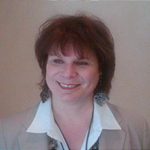Director of Publications, American Public Health Association
 First, tell us a bit about yourself (hometown, current locale, family, hobbies, community involvement?).
First, tell us a bit about yourself (hometown, current locale, family, hobbies, community involvement?).
I grew up in a small town outside of Pittsburgh, PA in a large Italian and Polish family community and got my undergraduate degree at the University of Pittsburgh. While there, I freelanced for the school papers and was very active in women’s issues and was allowed to do the first full-time internship for the women’s studies program. My internship took place in Washington, DC at the Women’s Campaign Fund. This was my first taste of what it was like for women running for political office and gave me a glimpse of what I could expect in DC. However I fell in love with Washington and specifically the Capitol Hill neighborhood and have been here ever since. My hobbies include traveling, cooking, reading, and knitting.
Describe some of your responsibilities, and how you or your organization fit into the scholarly communications web.
I am currently Director of Publications at the American Public Health Association and oversee journal and book publishing, advertising, licensing, and marketing. APHA is a leader in the public health community both domestically and internationally and we offer online and First Look access to the Journal of American Health. We plan to provide publications through Smart phones and PDAs in 2010 and expect to move much of our content online in the near future. Our organization already takes advantage of Twitter, YouTube, and other forms of social media.
What career path led to your current position?
I certainly did not take a direct course to where I am now but I have always worked in communications, marketing, or publishing and have had great mentors. I have also been responsible for membership and subscriptions as well as product development. I think an understanding of the combination of publications and marketing has helped me to see the entire picture: editorial, production, financial, market potential, etc. and I try to put myself in the place of the people whom I am marketing to and who will use the publication. I feel this gives me a better connection to the people I want to reach. I have also had the opportunity to work for great organizations and in interesting positions. At Heldref Publications I was Deputy Director of Marketing and Product Development, at Congressional Quarterly I was Marketing and Business Development Manager for CQ Press reference books, at the Smithsonian I was the Director of Publications and Communications for the National Science Resource Center and Assistant Director of Publications at the American Geophysical Union. Before my position as Assistant Director of Publications at AGU I was in charge of marketing and membership and had the collaborate with the American Society of Association Executives on a survey that was made into a book on why members decided to join and stay with an organization.
Where do you see scholarly communications heading, and what new directions interest you most?
I see scholarly communications advancing into new and exciting forms of content. Journals and books in some cases will become individual pieces of content joined together as well as a being sold as a whole. I remember being at an SSP seminar where a librarian said that he thought the future was buying content on a specific topic rather than subscriptions to journals and books. This creates an additional content vehicle for associations However, I do believe journal subscriptions will survive and I that there will always be those who want to read a printed book.
What are some of the surprises/obstacles that you’ve encountered during your career?
I haven’t had many surprises but there is the reoccurring obstacle about open access. By that I mean the assumption that there are no costs associated with open access. I think there is a lack of understanding of what it takes to get content to the point where it is available, online, for free.
What advice would you give to people interested in a career in scholarly communications? What new roles or opportunities do you see emerging in the field?
There are so many opportunities in publishing from serving as an editor, working on production, licensing content, or marketing a journal. I recommend that people interested in a career in scholarly publishing focus on what they love but take the time to understand the financial and marketing side as well, so that they can see the whole picture. The beauty of scholarly publishing is that you can do what you love and choose an association that represents something you believe in.
Profiled February 2010

